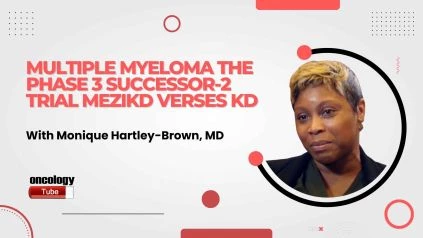Monique Hartley-Brown, MD, MMSc, from Dana-Farber Cancer Institute, conducted a significant clinical study called “SUCCESSOR-2” that focused on the treatment of relapsed/refractory multiple myeloma (RRMM).
This Phase 3 study aimed to compare the efficacy and safety of a combination therapy called MeziKd (mezigdomide, carfilzomib, and dexamethasone) versus the standard therapy of carfilzomib and dexamethasone (Kd).
Multiple myeloma is a type of cancer that affects plasma cells in the bone marrow. While there have been significant advancements in treatment, RRMM remains a challenging condition to manage.
Therefore, exploring new therapeutic options is crucial to improving patient outcomes.
The SUCCESSOR-2 study utilized a two-stage, randomized design to evaluate the effectiveness of MeziKd compared to Kd.
The combination therapy MeziKd included mezigdomide, a novel drug, along with the established drugs carfilzomib and dexamethasone. Carfilzomib is a proteasome inhibitor commonly used in the treatment of multiple myeloma.
The primary objective of the study was to assess the progression-free survival (PFS) in patients receiving MeziKd versus those receiving Kd. PFS is a crucial measure in cancer treatment trials and represents the length of time during which the disease does not worsen.
Secondary objectives included overall survival (OS), response rates, duration of response, and safety profile.
The study enrolled a significant number of participants with RRMM who had received at least one prior line of therapy. Patients were randomly assigned to either the MeziKd or Kd group.
The two-stage design allowed for an interim analysis after the first stage to assess the efficacy and safety of MeziKd. If the predefined criteria were met, the study would proceed to the second stage.
The findings from the SUCCESSOR-2 study will contribute to the growing body of knowledge on the treatment of RRMM. If MeziKd demonstrates superior efficacy or improved safety compared to Kd, it could potentially become a new standard of care for this patient population.
Dr. Monique Hartley-Brown’s expertise in multiple myeloma research, along with her affiliation with Dana-Farber Cancer Institute, adds credibility and significance to the study.
As an experienced clinician and researcher, Dr. Hartley-Brown is well-positioned to contribute valuable insights to the field of oncology.
In conclusion, the SUCCESSOR-2 study led by Dr. Monique Hartley-Brown, MD, MMSc, from Dana-Farber Cancer Institute is a Phase 3, two-stage, randomized study evaluating the efficacy and safety of MeziKd versus Kd in patients with RRMM.
The results of this study have the potential to inform future treatment strategies and improve outcomes for individuals living with this challenging condition.

